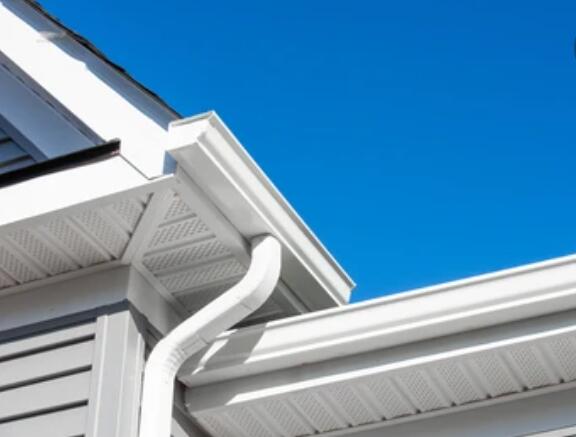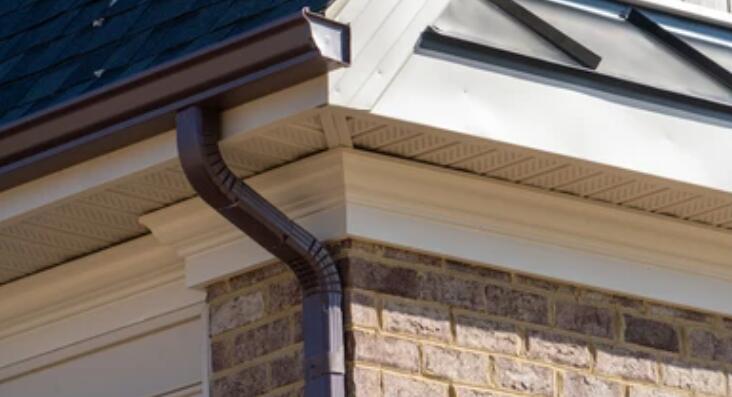THE LATEST IN ROOFING
Due to regional tastes and architectural styles, not all homes have roof gutters. However, for most homes and commercial buildings, the need to channel rainwater from the roof to the ground requires the use of rain gutters.

Evaluating Rain Gutters
As the name suggests, rain gutters are troughs placed at the bottom edge of your roof to collect and channel rain run-off. In this way, your foundation is protected from becoming flooded by the water that would otherwise pool on the ground beneath the roof, potentially causing structural damage such as cracks and basement flooding.
There are many types and styles of rain gutters available to homeowners. Rain gutters come in several types, sizes and shapes called profiles. These include U or half-round shapes as well as K configurations, in which the gutter front, when viewed from the side, looks like the letter K.
Most residential rain gutters come in two sizes, 5 inches, and 6 inches, and are made of either aluminum, galvanized steel, or copper in a standard "K" style. The typical 5-inch K-style gutter comes with 2-inch x 3-inch downspouts. A larger, 6-inch residential rain gutter system would consist of a 6-inch K-style gutter, using a 3-inch x 4-inch downspout. One foot of 5-inch K-Style gutter holds 1.2 gallons of water. One foot of 6-inch K-Style gutter holds 2.0 gallons of water.
The most popular residential rain gutter type is seamless aluminum. The metal comes on a long roll and it's formed into the shape and length required. Originally only available in silver, early aluminum rain gutters soon were painted white, and eventually painted in a variety of colors to match house siding, roof, and trim, making rain gutters not only functional but a design feature as well.
If you’ve recently purchased a home that doesn’t have gutters, you may be thinking that you can get by without investing in a drainage system. After all, rain water and melted snow runs off of your sloped roof and finds the ground eventually. However, doing without gutters and downspouts can be rather short-sighted. Allowing water to accumulate and pool at your home’s foundation can lead to a myriad of problems. Below are just a few things to consider when deciding whether you need gutters:

1. Gutters keep moisture away from your foundation
Without gutters, water that runs off of your roof lands at the base of your eaves, usually near your foundation. This can cause a number of problems. It can form unattractive trenches and ruts in your landscaping; it can cause water to seep behind your siding, causing the wood behind the siding to rot; and it can cause water to enter your basement, causing mold and mildew to be circulated throughout your living spaces.
2. Gutters keep water away from your attic
Gutters don’t just keep water out of your basement. They can help at the top of your house, also. Without gutters, some of the water that travels over your eaves is likely to seep behind the boards that protect your attic, allowing moisture to accumulate at the top of your house.
3. Gutters help to prevent insect infestations
Moisture around a home’s foundation creates an ideal breeding place for insects, such as termites and ants. Gutters and downspouts channel that water away from the foundation, making your home less attractive to bugs.
4. Gutters keep water from pouring down on you and your guests
Lastly, without gutters, rain water and melting snow come down off of the roof right where it falls. That can mean rivers of water cascading down on your head as you’re entering or exiting your home. Gutters divert this water to downspouts at the corners of your house, so you’ll stay dry when you’re opening your front door.
Whether to invest in gutters is a decision that needs to be carefully considered. You don’t want to save a few hundred dollars today, only to spend thousands to repair water damage later.



REQUEST A QUOTE
Copyright © Hangzhou Singer Building Materials Co., Ltd. All Rights Reserved |
Sitemap
| Powered by 
SEOKeywords:Roof Tile ManufacturerRoof Shingle ManufacturerAsphalt Shingle SupplierRain Gutter CompanyShingle Roofing CompanyWaterproof Tape For RoofPressed Steel Roofing TilesRain Gutter SystemGray Asphalt ShingleStone Coated Metal Roofing Manufacturer